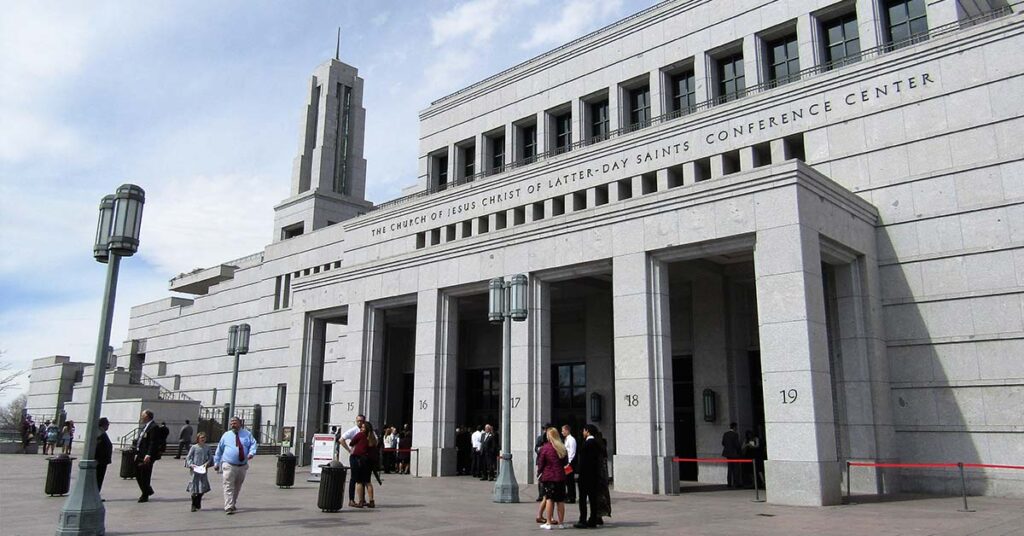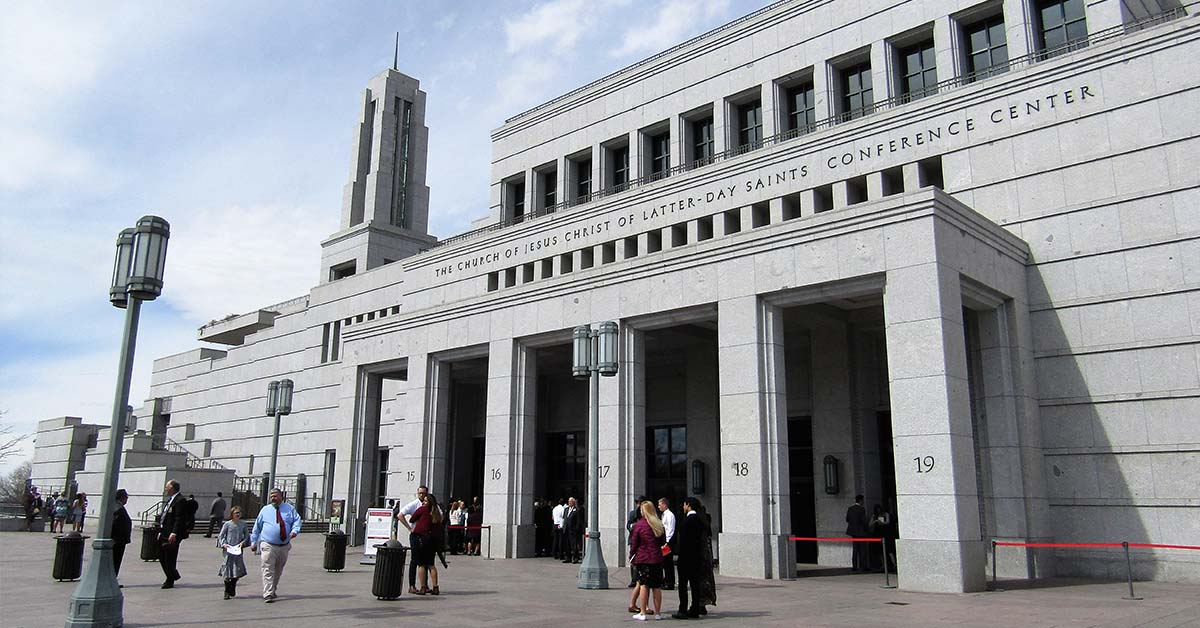Conference Talks Deal with Doubt and Imperfection in the Church, the Search for Happiness, and Family Support


“LDS Conference Center” by Ben P L is licensed under CC BY-SA 2.0
by John D. Gustav-Wrathall
Dealing with doubt, and coming to terms with the fallibility of Church leaders and members was a major theme of the 185th Semiannual General Conference of the Church of Jesus Christ of Latter-day Saints. At least 10 talks — two in each of the general sessions and in the priesthood session — dealt with these themes.
President Dieter F. Uchtdorf, in the opening talk of the first general session encouraged members of the Church to deal with faith challenges by focusing on the “simple truths,” and urged leaders to “avoid putting unnecessary burdens on our members.” “If you feel the Gospel isn’t working for you, I invite you to step back. Focus on the basic doctrines, principles and applications of the Gospel…. Start where you are.” Elder M. Russell Ballard, the second speaker of the same session echoed the theme of focusing on “simple, eternal truths,” acknowledging that Church leaders are “subject to human imperfection, neither perfect nor infallible,” though “perfectly dedicated.” “Too many,” he said, “think that leaders and membership should be perfect or nearly perfect.” They have good intentions, but make mistakes, he continued. But we shouldn’t focus only on the imperfections. Rather we should look at the larger patterns that show God’s hand in our lives in spite of the imperfections.
In the second general session, Elder Vern P. Stanfill urged members who are wrestling with doubt to “seek personal revelation.” Elder James B. Martino encouraged individuals who were having a hard time receiving personal revelation to remain constant in scripture study, prayer, and fasting, which he promised “will open doors of revelation.” Elder Neil L. Anderson, in the General Priesthood session, acknowledged that many in the 21st-century Church, in becoming aware of information about Church history, have been “honestly questioning,” but encouraged believers to give “Brother Joseph” the benefit of a doubt, trusting that over time choosing to practice our faith will give us perspective. President Uchtdorf took up the theme of doubt a second time, suggesting that faith “requires a little scientific curiosity, an experiment upon the word of God.” It “requires being patient and waiting on the Lord.” He emphasized that while to some it appears as if faith is a mysterious gift that some have and others don’t, we can choose to believe.
In the final general session, Elder D. Todd Christofferson took up the question, “Why does God use a church?” He drew laughter when he quoted President Monson’s description of how “we test one another with our idiosyncrasies, or our idiot-syncrasies.” But being part of a Church full of imperfect people and leaders allows us to “go beyond concepts and abstract words” and allows us to really put Gospel principles into practice as we bear with one another, and as we come to appreciate that “those which seem more feeble are all the more necessary.” Elder David A. Bednar said, “Some people find the human failings of the brethren troubling and faith-diminishing, but I find them faith-affirming.” Like Elder Ballard in the first session, he affirmed that it is through the imperfections that we can see signs of God’s hand working in the larger picture.
While addressing questions of doubt and of imperfections among Church members and leaders are relevant to many LGBT Mormons, there were also talks that addressed themes related to marriage and sexuality of more immediate relevance to LGBT Mormons.
During the General Women’s Session there were messages that emphasized the “Proclamation on the Family” theology, such as Linda S. Reeves statement that “Procreation is not an incidental part of the plan, it is the plan,” or Carol F. McConkie’s statement that “the most important thing we can do is prepare for marriage and family.” But another very strong theme was the idea that we are whole in ourselves, and that compassionate service, regardless of our family status, is what most conforms us to the image of Christ. For example Rosemary Wixom quoted the Proclamation statement that we are all sons and daughters of God and thus have a “divine nature and destiny” (a phrase quoted several other times in other talks this conference), but then proceeded to emphasize the importance of each of us finding out for ourselves what that destiny is for us personally, stating that our capacity to give and receive love (independent of marital status) is what makes us most like God. Other talks and presentations, including Pres. Uchtdorf’s concluding remarks, featured individuals not in heterosexual marriage finding meaning and happiness through faith and service.
Elder Jeffrey R. Holland’s talk in the 2nd General Session probably provoked the most intense discussion among LGBT Mormons in social media. The theme of his talk was the power and Christ-like nature of a mother’s unconditional love for her children. But the centerpiece illustration in this talk was a story of a young gay man who, wracked with guilt by his feelings of same-sex attraction, quit his mission, and, after five years of struggle, eventually returned to the mission field where he is currently serving. Many LGBT listeners were grateful for Elder Holland’s acknowledgment that this young man’s “sexual orientation did not miraculously change,” and “no one assumed it would.” Many also appreciated his acknowledgment of the difficulty of the challenges faced by LGBT individuals in the Church, and his tacit approval of unconditional nature of the mother’s love for her son. Many also expressed concern that the talk might imply condemnation of individuals who choose a path different from the path of returning to Church activity and mission, or might encourage parents to manipulate or pressure their LGBT/SSA kids toward certain outcomes. Nevertheless, as Randall Thacker put it, Elder Holland’s talk brought “relief for many in the LGBT Mormons, Families & Friends community who needed to hear a compassionate story shared from the pulpit of General Conference about the realities of Mormon families with gay children and the incredible force for good that mothers (and fathers) can be.”